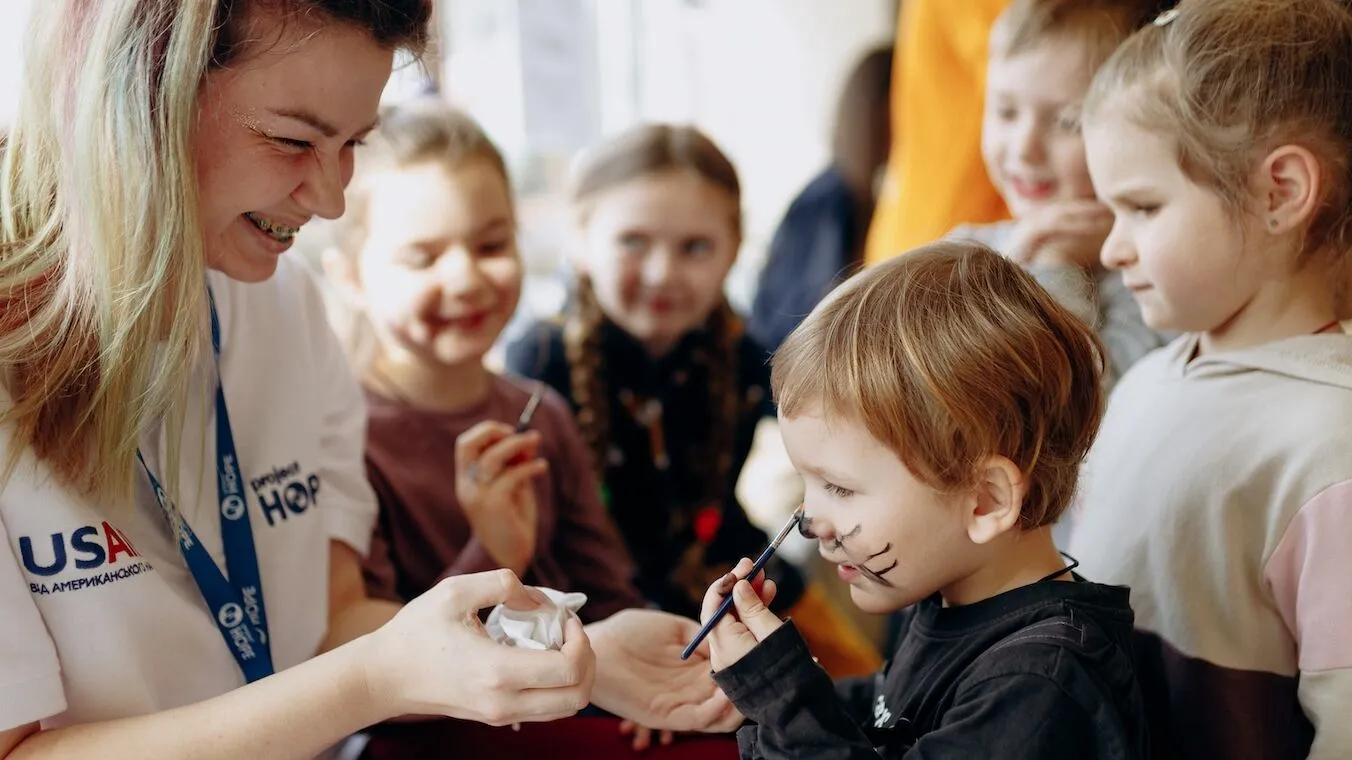How Psychologists Bring Healing in Ukraine
Amid the backdrop of war, Project HOPE psychologists are bringing hope and healing to thousands of people across Ukraine.

The need for psychologists in Ukrainian society is higher than ever. For more than a year, Ukrainians have lived their daily lives amid the realities of a full-scale war. As many as 15 million Ukrainians say they feel the impact of the war on their psycho-emotional state, and the prevalence of post-traumatic stress disorder among the Ukrainian population is as high as 30%.
As May is internationally recognized as Mental Health Awareness Month, it’s an important opportunity to acknowledge the essential role that psychologists play in Ukrainian society today. Psychologists help us understand ourselves and others; they work with people to help them overcome emotional difficulties, depression, anxiety, and bad habits, as well as support positive family relationships and so much more.
Mental health treatment must become a priority for all of Ukraine. But to get this right, we must build the capacity throughout the system, which will require significant investment and, above all, cultural shift: perhaps the most difficult change of all.
Psychosocial support plays a crucial role in Ukraine. Crisis psychologists and medical psychologists help people in personal distress, while specialists help take care of displaced persons and military personnel.
Project HOPE has established eight psychosocial support centers for internally displaced populations (IDPs) in Kyiv, Odesa, Zaporizhzhia, Dnipro, and Mykolaiv, where group and individual consultations, workshops, art therapy, and educational activities are held for both children and adults. To date, 25,882 Ukrainians have turned to our centers for psychological help.
“The IDPs were forced to completely change their lives,” said Olena, a psychologist at the Project HOPE support center in Kyiv. “They have broken lives, they have broken homes, broken dreams, and in this place, we are trying to help them find faith in the future and find internal resources to start life anew.”

Alla, 40, previously worked in a customer service center in Kherson before coming to Odesa in September 2022. She first visited the Project HOPE safe space in November 2022 to receive psychological support and restore social communication for her 10-year-old daughter. Later, Alla started attending master classes for adults and started individual consultations. The Project HOPE center quickly became a place where she regained her confidence, found support, and formed close social bonds with other women attending the center.
“I work individually with a psychologist, and I think it is very, very important,” she said. “Especially now. We have lost confidence in ourselves, confidence in tomorrow, and what comes after it. But I can already see my progress: I have learned to plan a few weeks ahead and am not afraid of it anymore because life goes on no matter what.”
IDPs who left their homes due to warfare in eastern Ukraine are also frequent visitors to Project HOPE centers. Many of them have had difficult experiences related to losing their loved ones and other traumatic events. Through working with a psychologist, they have the opportunity to reduce their feelings of anxiety and depression and can make new friends in their new place of residence.
“Once, a woman came to our psychological support group who was grieving the loss of her beloved mother, who died by suicide during the Russian occupation,” said Andrii, a psychologist at the Zaporizhzhia center. “At the first group session, the woman immediately shared what worried her because it had been growing inside her for a very long time. She felt that she was safe here and wanted to somehow get this pain out of herself.”
Afterward, Andrii scheduled a personal consultation, where they worked these feelings out together. Andrii explained that she was feeling guilty because she thought she could have done something to prevent this tragedy. Over time, the feeling of guilt subsided and the routine she needed now returned to her life. Today, this woman goes to the Project HOPE center regularly, where Andrii can constantly monitor her condition.

Children and teenagers are also regular visitors to Project HOPE’s centers. Most of them need psychological support and counseling for problems with behavior, aggression, and relationships with their families. Thanks to the centers, they get the opportunity to learn to manage their emotions, discover new hobbies, and socially alter. Center workers also help children prepare for school by teaching them self-control and time management skills.
Anastasia works at Project HOPE’s center in Odesa, and as part of her job she teaches children art therapy and prepares them for school. Anastasia adores children and communicating with them. This is the main reason she chose this path for herself.
“Once, a very sad boy came to us for art therapy,” Anastasia said. “I immediately wanted to cheer him up and to find out what happened. He admitted that he missed his school in Kharkiv and that he could not return there because of war, along with his friends and family.
“Honestly, in cases like that, it’s easy to get lost, but together we managed to find the small joys that he has now in his life: in Odesa, in our psychological center, he found a lot of new friends and acquaintances, learned to get along better with adults and peers, and also noted that he likes drawing and he notices how it improves his mental activity. I think he will continue to visit us because he has new friends and hobbies here.”
Among the activities at the IDP support centers, Project HOPE team members also help adults with job searches.
“Some adults lack self-realization,” Anastasia said. “Most of them are looking for a job, and we have special training for them. Some women come to us having difficulty realizing themselves in life and finding new friends because of the stress they have experienced. One woman came to us every day for all the activities, and after a week, she said that she felt much better from our classes and made new friends with our help. She liked our courses, especially when we knitted avoska (shopping bags). I am happy to hear such stories because it means my work is not in vain.”

roject HOPE’s mental health centers also employ psychologists who provide support to women who have survived gender-based and sexual violence. These psychologists provide special skills development trainings as well as practical steps women can use to overcome this violence.
Psychological consultations are also provided to older members of the population who have never been to therapy. Bottling up emotions is a frequent problem in Ukraine and can be transmitted from generation to generation. Older citizens who have attended therapy have told us they are satisfied and that it has improved their psycho-emotional state because they have never shared personal information with strangers before. Before, they always kept everything to themselves.
The role of psychologists in Ukraine cannot be overstated. In general, the need for psychological support in Ukraine has increased dramatically over the years, and psychological support is now a critical way to help people who have experienced emotional difficulties. Project HOPE has become an important resource for thousands of Ukrainians who are stepping up to seek help in difficult situations.
Mental Health Awareness Month is a great opportunity to thank all the psychosocial specialists for their work and dedication. Their work is playing a crucial role in building a healthier and more sustainable society.
Yaroslava Verbovetska is an Information Assistant on Project HOPE’s team in Ukraine.







